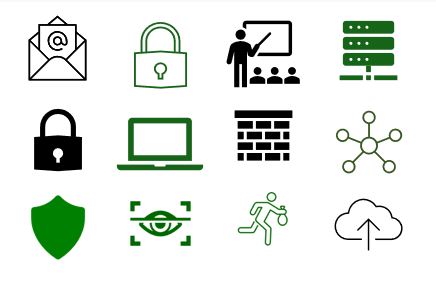Here are the 12 ways to protect your business from cyber attacks. Are you aware that:
- Since COVID-19, the FBI reported a 300% increase in reported
cybercrimes….. - One in five small businesses fall victim to a cyberattack and of those, 60
percent go out of business in six months… - Having an anti-virus software is not enough to protect businesses from
malware… - Cybersecurity awareness training for your staff is the best defense against
phishing attacks….
Following the “12 Ways to Protect Your Business from Cyber Attack” will get you started in improving your organization’s cybersecurity posture.
One of the ways malware can infect business networks is using email phishing. The statistic shows that the average cost of a data breach is $3.86m, and phishing accounts for 90% of all data breaches. We will help you implement a service structured to mitigate your risk of email phishing attacks.
Passwords
Set a password policy for your staff. Ensure passwords are complicated with a mix of upper and lower-case letters, numbers, and special characters. Require staff to change their passwords regularly. Third-party service password managers, can help you generate and store complicated passwords securely.
Staff Training
90 percent of data breaches are caused by employees. They are the most vulnerable target of phishing scams. Conduct regularly scheduled security training for your staff. Provide awareness of the threats that they are susceptible to, and train them on how to identify these threats and the best way to deal with them.
Security Assessment
The goal of cyber-security assessment is to identify risks that affect the overall health of your network. Cybersecurity risk assessment is critical to your business because it helps identify vulnerabilities, mitigate risks, and implement precautionary measures in place. We can help perform a regularly scheduled cybersecurity risk assessment for your company to help mitigate these risks.
Multi-Factor Authentication
Multi-factor authentication is the most prevalent way to secure your accounts: It asks you to authenticate that you are who you say you are by supplying not only your password, but a unique code supplied from your phone or an external app.
Software Updates
Most people delay software updates because it can take a bit of time. Delaying or canceling software updates is a big security risk you can take. It makes your network vulnerable for hackers to get in and access to steal sensitive information.
Firewall
Your network is susceptible to cyber-criminals hacking into your network. A firewall is a protective barrier between your data and the outside world. Without it, is comparable to an unlocked home and hoping no one breaks in and steals your valuables.
Cyber Insurance
Security breaches impact significant revenue loss for companies. Cyber insurance is crucial coverage to have as part of your business insurance policy. With cyber insurance, you will have peace of mind knowing that some of your financial losses can be recuperated.
Encryption
Encryption a process on which data is concealed so that it is hidden from unauthorized users. When your data is encrypted, and an unauthorized party tried to gain access, they will not be able to open it. Only the intended party can unlock the message.
Dark Web
The dark web refers to a portion of the internet that is hidden from search engines. Cybercriminals purchase and sell stolen data on the dark web. Many businesses are not aware that their credentials are listed. Signing up for a dark web scan will allow organizations to see if sensitive information is exposed.
Back-Up
If you don’t regularly back up your data, you are putting your business at risk. Data backup is important to safeguard the security of your business and its assets. There are plenty of ways that you can back up your business data, the crucial part is that your data is stored in a place where it is secure, and hackers are not able to get into it.
Contact Us to learn more about our services and how we can help improve your company’s cybersecurity posture at 818-471-4030.
